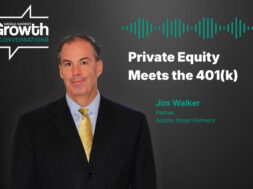Growth Summit Speakers Highlight Optimizing the Sales Engine
Panelists at ACG’s Growth Summit in Dallas said successful organic growth is driven, in large part, by implementing a defined and measurable sales strategy

The building blocks for successful organic growth start with examining and fine-tuning a newly acquired company’s sale process, speakers at ACG’s Growth Summit in Dallas on April 2 said. Panelists referenced the old adage, “you can’t manage what you can’t measure,” and noted the importance of sorting out lead generation strategies, successful performance tracking tools and getting the key senior executives in place post-acquisition.
John Dupuy, CEO of Audax-backed home improvement and renovation company Renovo Home Partners, said “people, process and systems are the three pillars of execution success.”
Summer Craig, partner at middle-market growth advisory firm Craig Group, who moderated the “Considerations in Supercharging Middle Market PortCo Organic Growth Following PE Investment” panel, agreed with Dupuy and selected process as the primary driver of success. “I’m going to put my thumb on the scale a little bit and start with process, because I think that is actually the most important thing,” she said.
Below are some of the highlights on the three pillars from the panel:
ACG Event Recap
WHAT: ACG Growth Summit in partnership with the 20th Texas Capital Connection
WHERE: Hyatt Regency, Dallas
WHEN: April 2, 2024
THE TAKEAWAY: Setting up a successful sales engine, implementing quality performance management tools and hiring experienced executives are some of the important tools after acquiring a business.
Process: Fine-Tuning the Sales Machine
Asked which critical sale processes must be in place in the first 100 days post-acquisition, Dupuy said “it comes down to lead generation and the pieces underneath that. Knowing what your sales model is, and recruiting and training your sales staff in a well-structured manner.” Beyond that, frequent tracking and reporting is important, Dupuy said. “Are you having weekly meetings and holding people accountable on their goals? Are you having that ongoing training?”
“The ability to set clear metrics and track those, that’s essential to figuring out how you grow this stuff,” said MJ Maloof, a venture capital investor and operator who currently serves as CEO of Utah-based Stealth Mode. “The joke in venture was that the diligence starts after the check gets cashed. A lot of times you find out what’s really going on after you’re already in it.”
“It’s about coming in and casting aside all assumptions, really figuring out what drives the business, what differentiates the product, what are the strengths and weaknesses of the team, without taking people at their word. That’s essential to avoiding big missteps,” Maloof said.
Systems: Measuring what Matters
Speakers also discussed tracking the right aspects of the sales strategy via CRMs. “Some type of tracking capability is absolutely critical. If you’ve got Google Analytics and a decently smart person and an Excel spreadsheet, you can do that,” Craig said. “You’re talking about the quality of interactions, the amount of people in an organization that you touch,” she added. “Diligence doesn’t typically do that work: identifying who are your buyers and how you’re going to expand those buyers to reach revenue goals.”
Taking a technology-first approach instead of an understanding- and problem-solving-based approach can be detrimental, said Maloof. “It’s a little bit like if you hired a contractor and they came and just hurled a toolbox at your house and hoped it would fix things,” he explained. “You have to understand what you’re doing before you get into this stuff. I’ve seen multiple implementations of a CRM go out because the first one didn’t reflect the actual sales cycle of the business.”
Particularly at a stage where you’re still trying to get a firm grasp on the underlying dynamics of the business, the objectives matter more than the KPI, in the sense that you don’t want to be chasing the wrong metric or perverting incentives.
MJ Maloof
Stealth Mode
Dupuy recommended Salesforce for CRM implementation, while Maloof suggested other cost-effective tools. “Salesforce revolutionized CRMs, but there are many more options today that are lighter touch and easier to implement. Even a relatively vanilla out-of-the-box system requires a pretty heavy implementation partner, more spend and more time, whereas some of the tools that are out there today can be done much leaner. If the goal is speed and not overcomplicating it, there are some other options to look at,” Maloof said.
When it comes to performance tracking, Maloof said he is a big fan of OKRs [objectives and key results] on top of KPIs. “The rationale for that is, particularly at a stage where you’re still trying to get a firm grasp on the underlying dynamics of the business, the objectives matter more than the KPI, in the sense that you don’t want to be chasing the wrong metric or perverting incentives.”
People: Prioritizing the First Senior Hires
Getting experienced professionals into top jobs at a newly acquired company is also important but should be done thoughtfully without running too fast, speakers said. “The most expensive mistake you can make are senior hires that you get wrong, so it behooves you to be very thoughtful about that process, but it also behooves you to set those people up for success,” Maloof said. “When you bring in senior level hires, it depends on what industry you’re in. If it’s tech, then it’s having someone who’s a leader or a visionary on product. If it’s more B2B, then it’s having a really strong business development leader. In a B2C perspective, it’s a CRO. Once you identify who’s going to drive your strategy, you need to set that person up for success,” Maloof said.
At Renovo, the company was a newly built business in 2021 under Audax that combined seven different acquisitions under one new brand, so most senior positions needed to be newly filled, Dupuy said. The company’s first hire was a CFO, then a CIO, then a VP of strategic integration and a CHRO. “We had some pretty good marketing people out there at the divisions, but we held back on the CMO. You can only afford so much as you’re building up,” Dupuy said. “We debated about bringing in a CMO at the time but said, let’s go with a value-added board member who’s actually going to help us identify a good internal candidate, but also help define the role much better, so she was a great addition.”
Value-added board members with specific skills can be very beneficial to an organization, Dupuy and Maloof agreed. “There is a big difference between a drive-by level of board membership and someone who’s actively involved, working cheek by jowl with the team,” Maloof said. “So [it’s about] creating a real structure, setting up regular meetings, enforcing a real-time commitment and making sure your incentive structure in terms of equity comp is aligned with those things.”
Combining sales, marketing, technology and strategy, Craig Group is a boutique advisory firm that specializes in revenue growth for middle-market, private equity-backed portfolio companies. Uniquely tenured with operating experience and a board savvy approach, Craig Group brings a proven track record of helping private equity-backed companies achieve their revenue and EBITDA growth goals. Learn more at craiggroup.io.
Middle Market Growth is produced by the Association for Corporate Growth. To learn more about the organization and how to become a member, visit www.acg.org.


